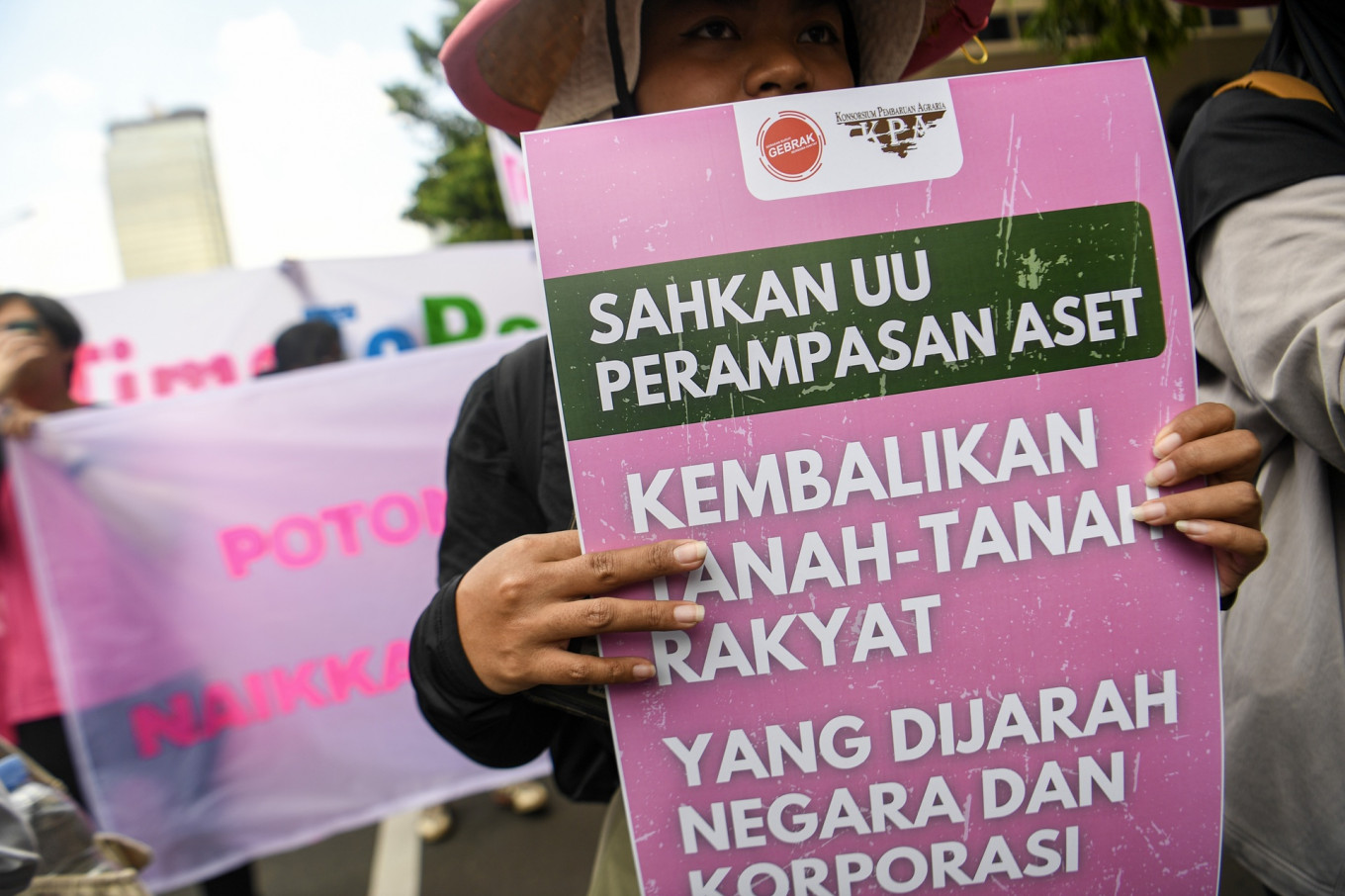Popular Reads
Top Results
Can't find what you're looking for?
View all search resultsPopular Reads
Top Results
Can't find what you're looking for?
View all search resultsCorruption should not pay
Without substantial changes, the bill's passage risks having only a minimal impact. It could even create new opportunities for corrupt law enforcers to abuse it for personal or political gain.
Change text size
Gift Premium Articles
to Anyone
I
n response to the recent demonstrations, the House of Representatives has finally tabled the long-stalled asset forfeiture bill back in the National Legislation Program (Prolegnas). But unlike the rallying cry for the bill to be enacted immediately, deliberation of the draft law looks set to begin only next year.
The political move, however, marks progress given that the House has been the stumbling block to the country’s efforts to enforce an asset forfeiture law since 2012. In May 2023 the House refused to debate the bill despite a presidential letter stipulating the government’s readiness to deliberate the draft law with the House.
Many have high hopes that the legislation, if passed, could serve as a powerful weapon in the fight against corruption, particularly to truly impoverish corrupt officials, which many deem as key to an effective deterrence. However, without substantial changes, the bill's passage risks having only a minimal impact. It could even create new opportunities for corrupt law enforcers to abuse it for personal or political gain.
As one Indonesian Democratic Party of Struggle (PDI-P) politician said, the asset forfeiture legislation could pave the way for extortion by law enforcement officials. The country’s largest party is known for its staunch opposition to the bill.
Notwithstanding the PDI-P’s reservations, several clauses within the proposed bill have been identified by many as problematic, as they could undermine public trust by prioritizing enforcement over due process. These provisions risk creating a legal framework that is more intimidating than it is protective.
For example, Article 2 allows the state to seize assets without first securing a criminal conviction. This nonconviction-based confiscation (NCBC) contradicts the presumption of innocence, a fundamental principle of the country’s legal system. The risk here is that individuals like micro and small entrepreneurs with incomplete financial records could have their legitimate assets wrongly classified as "illegitimate".
Article 5, paragraph 2 raises a separate but related issue. It permits asset seizure if a person's wealth is deemed "disproportionate" to their legal income. The phrase "disproportionate" is highly subjective and lacks a clear definition. The ambiguity could lead to a smallholder farmer who inherited land without formal documents being unjustly targeted.
Furthermore, the bill's forfeiture procedures, including blocking and seizing, reverse the burden of proof. After an asset is seized, the owner is required to prove that the property was acquired legally. This shifts the responsibility from the state to the individual, who may not have the legal knowledge or formal documentation to contest the seizure, risking the loss of their property.
The bill's imperfections should not justify another delay in its passage. The recent nationwide protests clearly show growing public resentment toward officials who brazenly flaunt their questionable wealth. While public officials are obligated to declare their assets, their lifestyles often disproportionately exceed their reported wealth.
In many countries an asset seizure law not only helps governments eradicate entrenched corruption, drug trafficking and other serious crimes, but also recover ill-gotten gains more efficiently. Our neighbor the Philippines managed to reclaim US$624 million in assets siphoned off by former president Ferdinand Marcos, thanks to its legislation.
A study by Indonesia Corruption Watch found that corruption cases inflicted losses of Rp 48.8 trillion ($2.9 billion) on the state in 2022, but only 7.8 percent of this amount was recovered by law enforcers. Public officials may be convicted of graft and serve their jail terms, but are still wealthy because much of their assets have been hidden in complex financial networks or invested in luxury goods that make them difficult to trace.
The momentum to pass this long-awaited bill should not be lost again. Meaningful public consultation will help lawmakers improve the draft and minimize legal loopholes, ensuring the anticorruption drive does not turn into a tool to maintain power.
Passing this law would not only strengthen our legal framework but also send a strong message that crime does not pay. Corrupt officials must be made to regret their wrongdoings.











